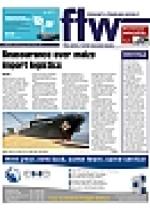A war of words has erupted
over Transnet’s application for
a massive tariff increase for its
pipeline division.
Until March 7, this is up
for public comments to the
National Energy Regulator of
SA (Nersa).
In this battle, FTW reader
Francois Nortje, a property
developer specialising in
logistics, accused the pricing
policy at TP, which runs
the multiproduct pipeline
corridor between Gauteng and
Durban, of being “destructive
communism”.
“Are you aware,” he asked
FTW, “of Transnet’s utterly
unbelievable arrogant
application to increase the
petroleum pipeline tariffs by
21.3%?”
This he blamed on a
combination of the pipeline
tariff being based on a costrecovery
principle, and the
R13 billion overspend on the
pipeline, which he felt should be
“ripped out of Transnet’s cost”.
While Nersa has not
suggested the cost removal
from Transnet’s budget, it did
express worry about its evergrowing
costs. In its discussion
document on the tariff
application it said: “Nersa has
been concerned for some years
about the escalating costs of
the new multi-purpose pipeline
(NMPP) and has commissioned
an investigation into whether or
not those costs were ‘prudently
acquired’. This investigation is
still under way. In the interim
Nersa has allowed those costs.”
But Transnet believes
its policy is justified, and
spokesman Mboniso
Sigonyela was adamant that
the application was based
on Nersa’s approved tariff
methodology for petroleum
pipelines. “A methodology,”
he said, “designed to ensure
that Transnet makes a return
commensurate with risk, and
recovers the cost of operations
and the investments it has
made on the system.”
Sigonyela was also none too
sure about Nortje’s figures. He
informed FTW that Transnet
had submitted an application to
Nersa “but requesting a 25.8%
increase in allowable revenue
for the 2016/2017 financial
year”.
“This,” he added, “will result
in an increase of 6.18 cents
per litre in the fuel price in
Gauteng.”
But, said Nersa in a
clarifying note: “Transnet
requested a 25.8% increase in
AR, which will in turn result in
a 21.3% increase in tariffs.”
Returning to cost-recovery,
Nortje referred to Transnet’s
submission to Nersa. “This
clearly showed how the
petroleum pipeline volumes
had dropped in the 2014/2015
fiscal year,” Nortje added.
“This as a result of the rapid
decline in diesel prices –
which has made it easier for
road transport companies to
compete with the pipeline.”
Sigonyela denied Nortje’s
statement that pipeline
volumes had dropped in
2014/2015. “Indeed, in the
year to March 30, 2015,” he
told FTW, “Transnet reported
a 3.6% increase in volumes to
17.18 billion litres from 16.58
billion litres.”
However this is contradicted
by Transnet’s own figures
in the Nersa discussion
document. Here, the volume in
2013/14 was declared as 771.28
mega litres, while in 2014/15
it was 640 .033ml. It is also
expected to still be down in
2015/16, for which Transnet’s
latest estimate is 683.457ml.
INSERT & CAPTION
The application was
based on Nersa’s
approved tariff
methodology for
petroleum pipelines.
– Mboniso Sigonyela
War of words erupts over 'massive' pipeline tariff hike
26 Feb 2016 - by Alan Peat
0 Comments
FTW - 26 Feb 16

26 Feb 2016
26 Feb 2016
26 Feb 2016
26 Feb 2016
26 Feb 2016
26 Feb 2016
26 Feb 2016
26 Feb 2016
26 Feb 2016
Border Beat
Featured Jobs
New
New
